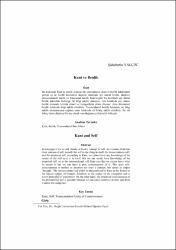Kant ve Benlik
Abstract
Bu makalede Kant’ın benlik anlayışı ele alınmaktadır. Kant’ın benlik hakkındaki görüşü şu üç benlik kavramına dayanır: kendinde şey olarak benlik, düşünen (transandantal) benlik ve fenomenal benlik. Kant’a göre biz kendinde şey olarak benlik hakkında herhangi bir bilgi sahibi olamayız, zira kendinde şey olarak benlik zamanda tezahür etmez ve kategorilerin altına düşmez. Ama fenomenal benlik hakkında bilgi sahibi olabiliriz. Transandantal benlik hakkında ise bilgi sahibi olamamamıza rağmen onun hakkında saf bilinç sahibi olabiliriz. Bu saf bilinç bizim düşünen bir şey olarak varolduğumuza ilişkin bir bilinçtir. In this paper I try to look closely at Kant& #8217; s concept of self. As it seems, Kant has three notions of self, namely the self as the thing in itself, the transcendental self, and the empirical self. According to Kant, we cannot have any knowledge of the nature of the self as it is in itself. But we can surely have knowledge of the empirical self. As to the transcendental self, Kant says that we cannot know what its nature is but we can have a pure consciousness of it. This pure self-consciousness is neither an intuition nor even a concept, but rather an empty & #8216; thought& #8217; . The transcendental self which is characterized by Kant as the formal or the logical subject of thought, functions as the source of the categories and a priori principles of experience. On the other hand, our empirical consciousness of the phenomenal self is possible because we can intuit ourselves in time and think it under the categories.


















